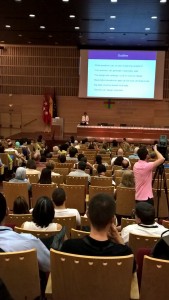
Twenty-Second International Conference on Learning – What counts as Learning? Big Data, Little Data, Evidence and Assessment 9-11 July 2015 Madrid Spain.
The conference opened with two good plenary sessions. One was from Diana Laurillard, Institute of Education, UK focused on ‘Our Challenge: Teachers must own the learning analytics that will solve education’s problem’s. Diana discussed the data we now all have access to with online programmes and the use of virtual learning environments. We can explore students’ participation with different activities and can look at the time they spend and what peak times students engage in activities. We need to use this data to undertake research and explore the use of technology.
Much of our data is local but this is still valuable data to collect and analyse so that we can share this with others. Diana then used an example from a MOOC she had run last year but this did have 9,000 participants over 6 weeks which did have the usual decline in participation that MOOCs have. However there was still a good level of engagement and so they undertook a post course survey and asked about the course and the activities the students engaged in. The participants’ top choice was that of peer review and the other top listed activities all involved some form of collaboration with peers such as discussion forums and using Diigo to share resources.
Diana then also discussed the Learning designer tool they developed to examine modules and programmes and how the planning of the activities engaged students in different level of activity. This tool is available to anyone to use and can be found at http://learningdesigner.org

The second plenary session was by Pierpaolo Limone, University of Foggia, Italy and was about ‘Data Driven Credentials and Quality Assurance in the European Higher Education Area. This discussion focused on some work that 15 universities had been working on together to examine degrees and their quality assurance and how creditability is assured.
The role of Universities is changing today at least in Italy. External drivers are the same as for others and involve digital capacity, mass education and the increase in private education. There is also increased mobility of both staff and students.
There has been a new document published in Italy about quality assurance which was published in May 2015 and looks at continuous improvement and ensuring the learning environment is fit for purpose. The document has been published after the group had already started working together to look at a common framework for quality. However this document supported the project. The universities have been working together and sharing information from analytics about student admission, learning and teaching activities undertaken on programmes and assessment results. The interest is around the competence of students on completing the programmes and how credibility of degrees can be tested and assured. Whilst this is an ongoing project there have been some good developments around governance because they have been sharing data across one common platform.



Leave a Reply